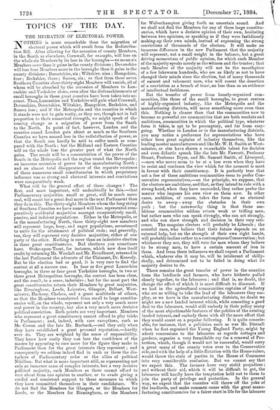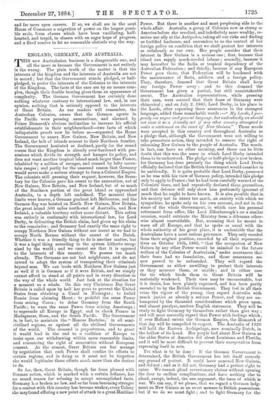TOPICS OF THE DAY
THE MIGRATION OF ELECTORAL POWER.
NOTHING is more remarkable than the migration of electoral power which will result from the Redistribu- tion Bill. After allowing for the accession of county Members, in the South as elsewhere, Cornwall, for example, will lose on the whole six Members by its loss in the boroughs—we mean six Members more than it gains in the county divisions ; Devonshire will lose four Members more in the boroughs than it gains in the county divisions ; Dorsetshire, six ; Wiltshire, nine ; Hampshire, four ; Berkshire, three ; Sussex, six ; so that from these seven Southern Counties alone thirty-eight Members will vanish, all of whom will be absorbed by the accession of Members to Lan- cashire and Yorkshire alone, even after the disfranchisements of small boroughs in these great counties have been taken into ac- count. Thus, Lancashire and Yorkshire will gain what Cornwall, Devonshire, Dorsetshire, Wiltshire, Hampshire, Berkshire, and Sussex lose ; and if the Metropolis and the counties in which it stands were not to gain vastly, as they are, though not in full proportion to their numerical strength, we might speak of the coming change as a migration of power from the South to the North. In point of fact, however, London and the counties round London gain about as much as the Southern Counties we have named lose in the redistribution of power, so that the South can hardly be said to suffer much as com- pared with the North ; but the Midland and Eastern Counties will on the whole lose the greater part of what the North gains. The result will be a concentration of the power of the South in the Metropolis and the region round the Metropolis ; an immense accession of power to the manufacturing North ; and an almost total disappearance of the separate existence of those numerous small constituencies in which proprietary influence was so strong and electoral interests and convictions were comparatively weak.
What will be the general effect of these changes ? The first, and most important, will undoubtedly be this,—that Parliamentary majorities, small or great, will be much more real, will count for a great deal more in the next Parliament than they do in this. The thirty-eight Members whom the long string of Southern Counties we have named will lose, represented com- paratively accidental majorities amongst comparatively small, passive, and indolent populations. Either in the Metropolis, or in the manufacturing North, these thirty-eight new members will represent large, busy, and eager populations, accustomed to unite for the attainment of political ends ; and generally, too, they will represent very decisive majorities, either of one party or the other. Nothing is rarer than an indecisive election in these great constituencies. Bad elections you sometimes have. Stoke-upon-Trent, for instance, which now does itself credit by returning Mr. Woodall and Mr. Broadhurst, returned in the last Parliament the advocate of the Claimant, Dr. Kenealy. But be the election bad or good, it is very rare to find the contest at all a narrow one. In four or five great Lancashire boroughs, in three or four great Yorkshire boroughs, in two or three great Metropolitan boroughs, the contest has been close, and the result, in a sense, indecisive ; but for the most part the great constituencies return their Members by great majorities, like Birmingham, Leeds, Leicester, Glasgow, Belfast, West- minster, Hackney, Chelsea, and a great multitude of others, so that the Members transferred from small to large constitu- encies will, on the whole, represent not only a very much more real power in the country, but also a very much more decisive political conviction. Both points are very important. Members who represent a great constituency cannot afford to play tricks in Parliament ; and, indeed, with rare exceptions, such as Mr. Cowen and the late Mr. Roebuck,—and they only when they have established a great personal reputation,—hardly ever do. They are weighted by the sense of responsibility. They know how easily they can lose the confidence of the masses by appearing to care more for the figure they make in Parliament than for the great interests they represent ; and consequently we seldom indeed find in such as these the dis- turbers of Parliamentary order or the allies of political Nihilism. But what is more important still, as representing not only an immense mass of complex interests, but a very decisive political majority, such Members as these cannot afford to veer about from one opinion to another, or to evade giving a cordial and consistent support to those measures to which they have committed themselves in their candidature. We do not find the Members for Glasgow, or the Members for Leeds, or the Members for Birmingham, or the Members for Wolverhampton giving forth an uncertain sound. And we shall not find the Members for any of these large constitu- encies, which have a decisive opinion of their own, hesitating between two opinions, or speaking as if they were fastidiously making-up their own minds, instead of expressing the strong convictions of thousands of the electors. It will make an immense difference in the new Parliament that the majority will represent, not a small weight in the balance, but a great driving momentum of public opinion, for which each Member of the majority speaks merely as the witness and the trustee •, that each Member of the majority will not be the mouthpiece of a few lukewarm hundreds, who are as likely as not to have changed their minds since the election, but of many thousands' of earnest and vehement men, who will resent the desertion of a conviction as a breach of trust, no less than as an evidence of intellectual feebleness.
But the transfer of power from loosely-organised com- munities, like those of the small boroughs, to great centres of highly-organised industry, like the Metropolis and the manufacturing districts, will mean something more even than this. Nothing is clearer than that the communities now to become so powerful are communities that are both resolute and ambitious, communities in which the political type, whatever form it takes, is apt to be peremptory, and far from easy-- going. Whether in London or in the manufacturing districts, you may notice a preference for representatives who have either been great captains of industry themselves, like the leading master manufacturers and like Mr. W. H. Smith at West- minster, or else have shown a remarkable talent for decisive and even didactic speech like the late Mr. Fawcett, Professor Stuart, Professor Bryce, and Mr. Samuel Smitb, of Liverpool, —men who never seem to be at a loss even when they have to resist and condemn the view which for the moment is most in favour with their constituency. It is perfectly true that not a few of these ambitious communities seem to prefer Con- servative representatives,—on the principle, we suppose, that the electors are ambitious, and that, as they intend to rule with a strong hand, when they have succeeded, they rather prefer the master who imposes his own view on them now. In other cases, ambition, of course, takes the form of an electoral desire to sweep - away the obstacles in their own path ; but the noteworthy thing is that these am- bitious communities seldom return weak or trifling men, but rather men who can speak strongly, who can act strongly, and who can show strength and decision in their very reti- cence. The sanguine electors will probably be Liberals ; the scornful ones, who believe that their future depends on no external help, but on the strength of their own right hands, will probably incline rather to a contemptuous Conservatism; but whichever they are, they will vote for men whom they believe to be strong men, to have a certain amount of iron in them. And from these influences we shall expect a Parliament which, whatever else it may be, will be intolerant of shilly- shally, and determined not to be foiled in doing what its majority desires to do.
There remains the great transfer of power in the counties from the landlords and farmers, who have hitherto pulled closely together, to the labourers ; and that is, no doubt, the change the effect of which it is most difficult to discount. If we had in the agricultural communities captains of industry who are as willing to take the lead of the labourers they em- ploy, as we have in the manufacturing districts, no doubt we might see a new landed interest which, while conceding a good deal to the labourers, would still embody in their policy many of the most objectionable features of the politics of the existing landed interest, and embody these with all the more effect that they would count on a popular following. It is quite conceiv- able, for instance, that a politician such as was Mr. Disraeli when he first organised the Young England Party, might by adroit concessions to the labourers as regards cottages and gardens, organise a very formidable cry for a renewal of Pro- tection, which, though it would not be successful, would carry a great many of the county votes over to the Conservative side, and with the help of a little flirtation with the Home-rulers, would throw the state of parties in the House of Commons into very considerable confusion. But we cannot say that we expect this. The farmers have very stolid prejudices ; and without their aid, which it will be difficult to get, the labourers will hardly have the temptation held out to them to join the party of privilege and protection. In the general way, we expect that the counties will throw off the yoke of the landlords, and make common cause with the great manu- facturing constituencies for a fairer start in life for the labourer and for more open careers. If so, we shall see in the next House of Commons a migration of power on the largest possi- ble scale, from classes which have been vacillating, half- hearted, and torpid, to classes with an eager hope of progress, and a fixed resolve to let no reasonable obstacle stop the way.



































 Previous page
Previous page